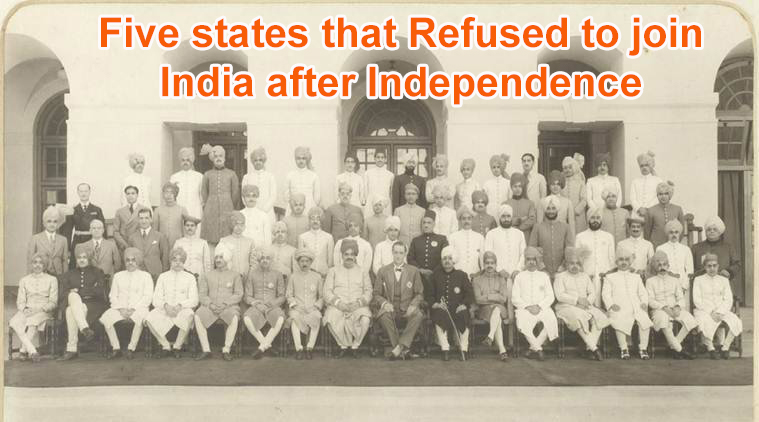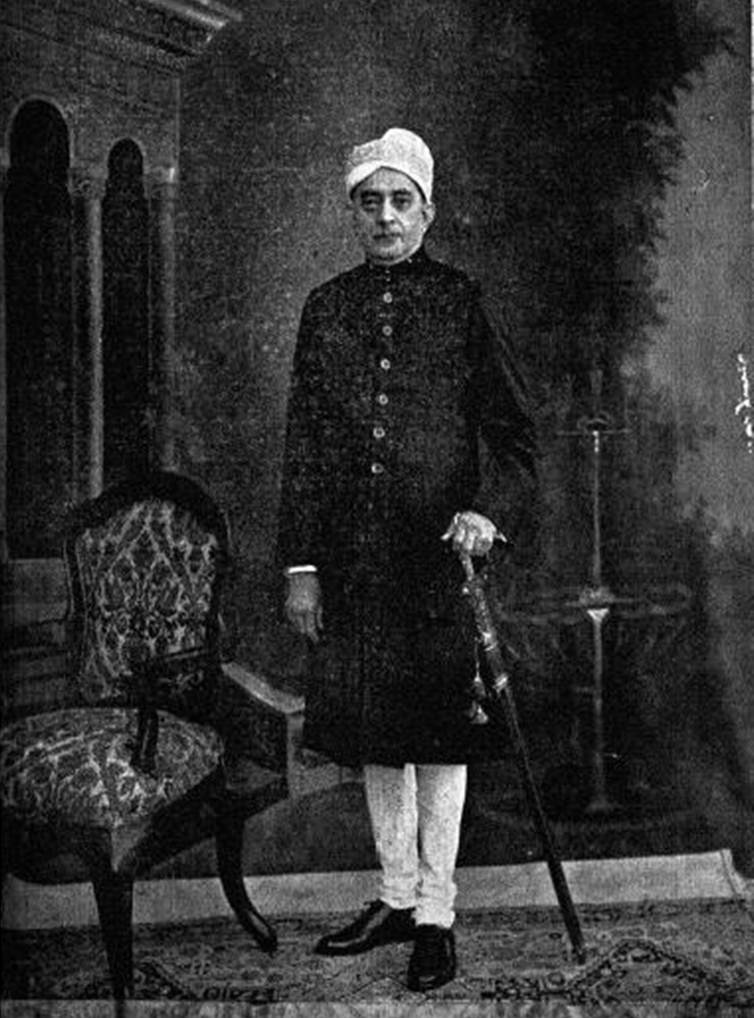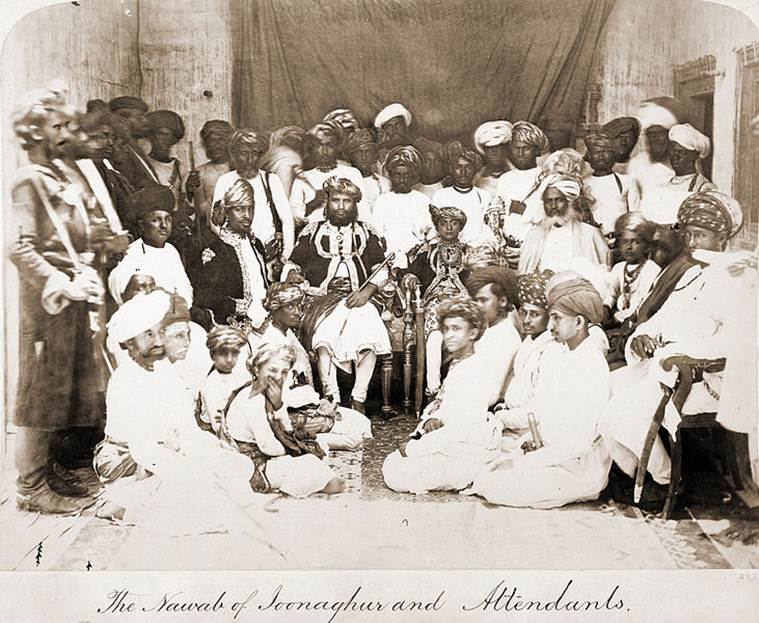Five states refused to join India after Independence

Five states that refused to join India after Independence
Five states refused to join India after Independence
Five states refused to join India after Independence: Some of them thought this to be the best moment to acquire independent statehood, while there were others who wanted to become a part of Pakistan. Here are the cases of five princely states that opposed the idea of joining India.
The southern Indian maritime state was one of the first princely states to refuse accession to the Indian union and question the Congress’ leadership of the nation. The state was strategically placed for maritime trade and was rich in both human and mineral resources.

Independence day India, princely states of India, 70 years of independence, 70th independence day, August 15, 15th August, 15th August 1947, 15th august 2017, India, India history, India news, Indian Express
Sir C. P. Ramaswamy Aiyar (Wikimedia Commons) | Five states refused to join India after Independence
Sir C. P. Ramaswamy Aiyar, the dewan of Travancore and a distinguished lawyer by profession, had by 1946 declared his intention of forming an independent state of Travancore that would be open to the idea of signing a treaty with the Indian union. Historian Ramachandra Guha notes that Travancore’s bid for independence was in fact propelled by Mohammed Ali Jinnah. Sir C.P. Aiyar is also said to have had secret ties with the UK government who were in support of an independent Travancore in the hope that they would get exclusive access to a mineral called monazite that the area was rich in, and would give an edge to Britain in the nuclear arms race. While the Dewan stuck to his position till as late as July 1947, he changed his mind soon after he survived an assassination attempt by a member of the Kerala Socialist Party. On July 30, 1947, Travancore joined India.
Jodhpur – Five states refused to join India after Independence
The Rajput princely state of Jodhpur was a strange case of tilting towards Pakistan despite having a Hindu king and a large Hindu population. While the prince, Maharaja Hanvant Singh, was strong in his willingness to join India, he somehow got the idea that it might be more beneficial for him to join Pakistan on account of the fact that his state shared a border with the soon to be born country. Further, he was lured into joining Pakistan by Jinnah who offered him full port facilities in Karachi along with military and agrarian support. However, when Vallabhbhai Patel was made aware of the possibility of Jodhpur going to Pakistan, he immediately contacted the prince and offered him sufficient benefits, and explained to him the problems of joining a Muslim state. Eventually, the Jodhpur prince was won back. Historian Ramchandra Guha, in his work “India after Gandhi”, notes that on being presented with the Instrument of Accession, the Jodhpur prince dramatically took out a revolver and held it on the secretary’s head saying, “I will not accept your dictation”. However, a few minutes later he calmed down and signed the document.
Bhopal – Five states refused to join India after Independence
Another state that wished to declare independence was Bhopal, which had a Muslim Nawab, Hamidullah Khan, ruling over a majority Hindu population. A close friend of the Muslim League, the Nawab was staunchly opposed to Congress rule. He had made clear his decision to attain independence to Mountbatten. However, the latter wrote back to him stating that “no ruler could run away from the dominion closest to him”. By July 1947, the prince became aware of the large number of princes who had acceded to India and decided to follow suit.
Hyderabad – Five states refused to join India after Independence
The case of Hyderabad was by far the most significant and complicated challenge among the princely states. Lying in the Deccan plateau, the state covered a large portion of the center of India. During the independence of the country, Nizam Mir Usman Ali was presiding over a largely Hindu population. When the British decided to leave, the Nizam was very clear on his demand for an independent state and consequently becoming a member of the British Commonwealth of nations. Lord Mountbatten, however, made it very clear that the Crown would not agree to Hyderabad becoming a member of the British commonwealth, except through either of the two new dominions.
While the tussle over Hyderabad grew stronger over time, violence and demonstrations across the state became a regular feature. The Nizam also drew support from Jinnah who pledged to defend the oldest Muslim dynasty in India. For Patel, however, an independent Hyderabad was equivalent to having cancer in the belly of India.
Once Lord Mountbatten resigned in June 1948, the Congress government decided to make a more decisive turn. On September 13, Indian troops were sent to Hyderabad in what came to be known as ‘Operation Polo’. In an armed encounter that lasted for about four days, the Indian army gained full control of the state. Later, in an attempt to reward the Nizam for his submission, he was made the governor of the state of Hyderabad.
Junagadh – Five states refused to join India after Independence
Apart from Hyderabad, there was one more state that had not acceded to the Indian union by August 15, 1947, the Gujarati state of Junagadh. Junagadh was the most important among the group of Kathiawar states. Here too, the Nawab, Muhammad Mahabat Khanji III ruled over a large Hindu population. However, when on July 25, 1947 Lord Mountbatten addressed the princes, the Dewan of Junagadh had made very clear his decision to advise the Nawab on joining the Indian union.

Junagadh was the most important among the group of Kathiawar states. Here too, the Nawab, Muhammad Mahabat Khanji III ruled over a large Hindu population. (Wikimedia Commons)
In early 1947, the Dewan of Junagadh, Nabi Baksh invited Sir Shah Nawaz Bhutto of the Muslim League to join the state council of ministers. In the absence of the existing dewan, Bhutto took over the office and pressed the Nawab to accede to Pakistan. When Pakistan accepted Junagadh’s request for accession, the Indian leaders were enraged as it went against Jinnah’s two-nation theory.
The disturbed situation in Junagadh led to a complete breakdown of the economy and consequently, the Nawab fled to Karachi. Vallabhbhai Patel requested Pakistan to allow a plebiscite in Junagadh and eventually sent in troops to force the annexation of three of its principalities. In the face of an acute shortage of funds and forces, the Dewan was forced to accede to the Indian government. Eventually, on February 20, 1948, a plebiscite was held in the state wherein 91 percent of the voters chose to join India.
JOIN WDA SOLDIERS ACADEMY LUCKNOW
Five states refused to join India after Independence
Best Army GD Coaching in Lucknow | No-1 Coaching for Army physical and written exam preparation in Lucknow
Mobile No.: +91-8881002943
Address: E1/5, near Power House, Sector B, Sector CS, Aliganj, Lucknow, Uttar Pradesh 226024
E-mail-ID: wdasoldiersacademy@gmail.com
Website: Five states refused to join India after Independence
https://www.warriorsndaacademy.com/best-army-gd-coaching-lucknow/
https://warriorsdefenceacademy.co.in
https://warriorsdefenceacademy.com
Five states refused to join India after Independence: WDA Soldiers (Warriors Defence Academy Soldiers) a unit of Warriors Defence Academy in Kapoorthla Lucknow Uttar Pradesh is the Best Army GD Coaching Lucknow, Physical and Written Academy in India. Welcome to Army GD Coaching Lucknow India WDA Soldiers Lko, @20% Discount. Call 08881002943 Top Army Soldiers Coaching in India, Best Army GD Coaching in India, Best Army Coaching in India, Best Army Academy in India. Five states refused to join India after Independence.




